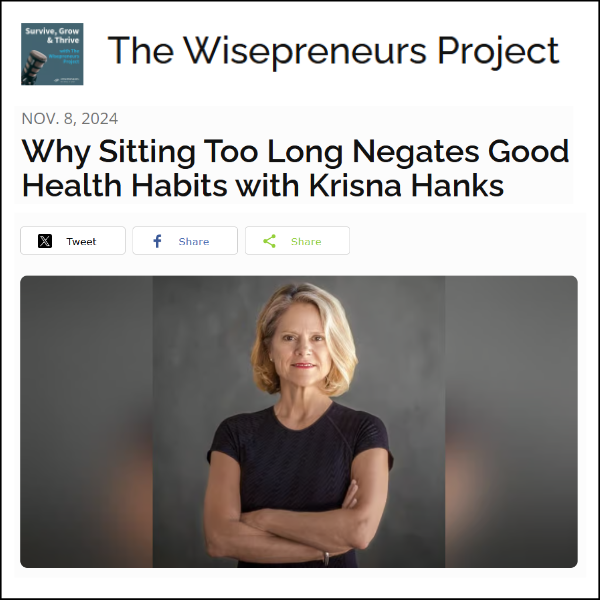In a recent interview on the Wisepreneurs Podcast with host Nigel Rawlins, Ovadia Heart Health’s Director of Employee Wellness Krisna Hanks, shared insights on the transformative potential of employee wellness programs. With a dynamic background that spans decades in the fields of dance, fitness, and health coaching, Krisna discussed her passion for improving metabolic health, particularly in the workplace, and emphasized the importance of addressing sedentary behavior.
In a recent interview on the Wisepreneurs Podcast with host Nigel Rawlins, Ovadia Heart Health’s Director of Employee Wellness Krisna Hanks, shared insights on the transformative potential of employee wellness programs. With a dynamic background that spans decades in the fields of dance, fitness, and health coaching, Krisna discussed her passion for improving metabolic health, particularly in the workplace, and emphasized the importance of addressing sedentary behavior.
From Dance to Metabolic Health Coaching
Krisna’s journey is rooted in a deep connection to movement, having been a professional dancer until age 43 and later shifting into executive and health coaching. Her experience across disciplines, including Pilates and senior fitness, has given her a unique perspective on the importance of physical activity throughout life stages. Now, as part of the Ovadia Heart Health team, she focuses on metabolic health, leveraging her expertise to guide organizations in creating impactful wellness programs.
The Impact of Sedentary Behavior
During the podcast, Krisna highlighted findings from a recent white paper she authored, The Impact of Prolonged Sedentary Behavior at Work, which explores the detrimental effects of prolonged sitting. Krisna explained, “Too much sitting is not the same as too little exercise.” This distinction is critical as many individuals, including those who meet recommended exercise guidelines, still suffer from metabolic health issues due to extended periods of inactivity.
Krisna emphasized the concept of the “active couch potato,” a term that describes people who engage in regular exercise but negate those benefits by sitting for long hours. “It blew my mind to realize that even if we meet exercise targets, our metabolic markers can still be compromised if we are sitting for back-to-back hours,” she said.
Metabolic Health in the Workplace
Krisna’s role at Ovadia Heart Health focuses on shifting the approach from traditional disease management to proactive wellness. She shared an example of a current program with a manufacturing company that includes on-site visits, educational sessions, and one-on-one coaching. Employees undergo lab tests at the start and end of the program to measure improvements in metabolic health markers, such as blood glucose, triglycerides, and HDL cholesterol.
“We’re not just managing disease; we’re laying a foundation for good metabolic health,” Krisna noted. The program’s holistic approach includes education on sleep hygiene, stress management, and nutrition, tailored to meet the unique needs of shift workers and others with demanding schedules. “It’s about empowering employees to take small, actionable steps that have a big impact over time,” she added.
Breaking Up Sedentary Time
A key focus of Krisna’s work is encouraging people to interrupt prolonged sitting with brief, light-intensity activities. “Think of these as metabolic sparks,” she said. “Even standing up, doing a few air squats, or taking a short walk can stimulate metabolic processes.” She stressed that breaking up sitting time isn’t just for those in the workplace but applies to everyone, including those working from home or retired.
Krisna pointed out that the research shows individuals who take frequent breaks perform better cognitively than those who sit for extended periods. “Taking short breaks throughout the day not only supports physical health but can also boost mental clarity and productivity,” she explained.
A New Era for Employee Wellness
Krisna is optimistic about the future of employee wellness, especially as more companies recognize the link between metabolic health and overall performance. “We’re at an exciting point where employers are starting to see the value in preventative wellness programs,” she said. By shifting the focus from reactive healthcare to proactive wellness, organizations can help employees achieve better health outcomes and improve productivity.
Krisna concluded the interview by encouraging listeners to explore ways to integrate more movement into their daily routines, whether at work or home. “Don’t accept that aging means you have to be ill,” she advised. “Taking control of your metabolic health is one of the best investments you can make for long-term wellness.”
Listen to the Full Interview:
To hear more of Krisna Hanks’ insights on employee wellness and metabolic health, listen to the full podcast episode on the Wisepreneurs Podcast and download the white paper she co-authored on the detrimental effects of sedentary behavior from the Ovadia Heart Health Wellness Page.

